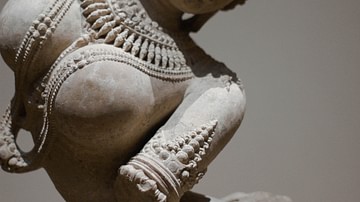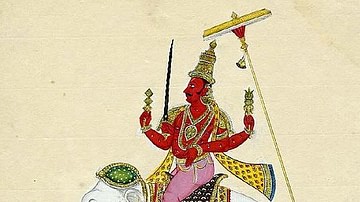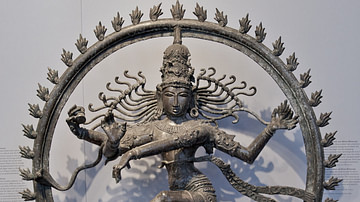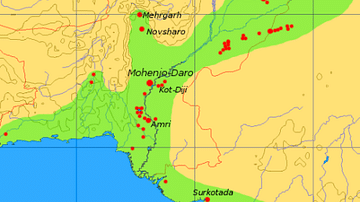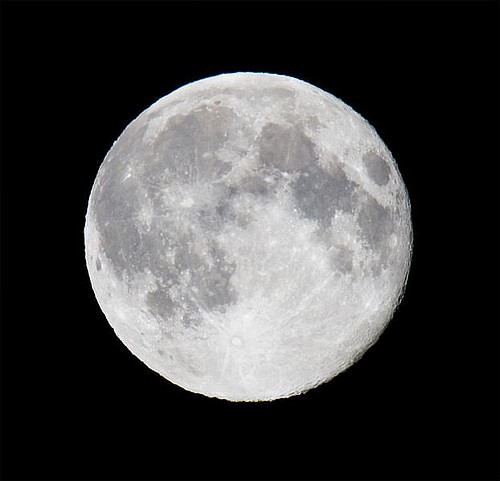
Soma was a fermented juice drink which was believed to have been consumed by the Hindu gods and their ancient priests, the brahmanas, during rituals. Thought to be an elixir its consumption not only healed illness but also brought great riches. Soma is personified by the god of the same name who is also the god of sacrifices and who may, in some texts, be associated with the Moon. The drink is famously described and praised in a Mandala of the sacred Hindu text, the Rigveda.
The Drink Soma
Perhaps first used in ancient Persia, Soma juice may have derived from the fermented milky sap of Asclepias acida, a climbing plant which thrives in mountain areas. Other candidates for the origin of the drink, or partial ingredients therein, include hallucinogenic mushrooms, honey, cannabis, blue lotus, milk, and pomegranate.
In mythology, the gods gained their immortality by drinking Soma and it was the favourite tipple of the great god Indra. They then gave the drink to the archer-god Gandharva for safe-keeping but one day Agni, the fire-god, stole it and gave it to the human race. Not only drunk by priests for its sacred nature it was also credited with uplifting qualities, giving the drinker a boost in energy and alertness. These effects meant that the drink has been considered divine since ancient times; a beverage which brought humans closer to the divine. It was also commonly offered in libations to the gods by worshippers.
The God Soma
The drink was personified as the god Soma who was considered primeval amongst the gods and a bringer of health and wealth; in many ways he is similar to the Greek and Roman gods of wine Dionysos and Bacchus while the drink is the equivalent of ambrosia in those traditions. In addition, Soma is regarded as the deity who supervises Hindu religious sacrifices and he represents the direction North-east. In the Puranas religious texts, Soma is described as riding a chariot with three wheels, which is drawn by a team of ten pure-white horses.
Later, Soma was also identified with the moon-god Osadhipati (or alternatively Chandra), a natural extension of the latter's role as the lord of herbs. In the Puranas Soma as the moon-god appears in several separate puranas, often with conflicting descriptions. He may be, variously, the son of Atri (the sage and one of the ten lords of creation), Prabhakara (of the Atri race), Parjanya (the Vedic rain-god), or Dharma (another ancient sage). In yet another version Soma was born from the churning of the milky ocean when the world was first created. He is also, confusingly, described as a warrior of the kshatriya caste and as a priest of the brahman caste. In the Vedas Sita, the daughter of Savita, the Sun, was Soma's lover but his most famous companions are Rohini and Tara.
Soma & Rohini
One of the most picturesque myths involving Soma is, in his guise as the moon, when he ambitiously married all 27 daughters of Daksa, the great sage. The number of these beauties is not coincidental as they are the personification of the 27 lunar asterisms. Soma, perhaps inevitably, developed a favourite, Rohini (the Red One - the constellation of Taurus), the fourth sister, and this caused great jealousy amongst the other 26. As a body, they complained to their father but he could do nothing about Soma's preference. As a result, Daksa cursed Soma so that he would never have children and, even worse, ensured that he would slowly die of consumption. Hearing this, Daksa's daughters thought that their father had gone rather too far and pleaded with him not to be so harsh. Consequently, Daksa modified his curse so that instead of expiring completely Soma would die temporarily and then rejuvenate in a continuous cycle. And this was the explanation for the periodical waning of the moon.
Soma & Tara
In another famous episode from Hindu mythology, the amorous Soma this time abducted Tara, the wife of Brhaspati, the god-priest who acted as messenger and link between humanity and the gods. In taking Tara, Soma sparked off a war between the gods and demons (asura), which only the intervention of mighty Brahma brought to an end. Tara was then returned to her family but not before she had fallen pregnant with Soma's son Budha (not to be confused with Buddha), the personification of the planet Mercury and father of the Lunar race.
